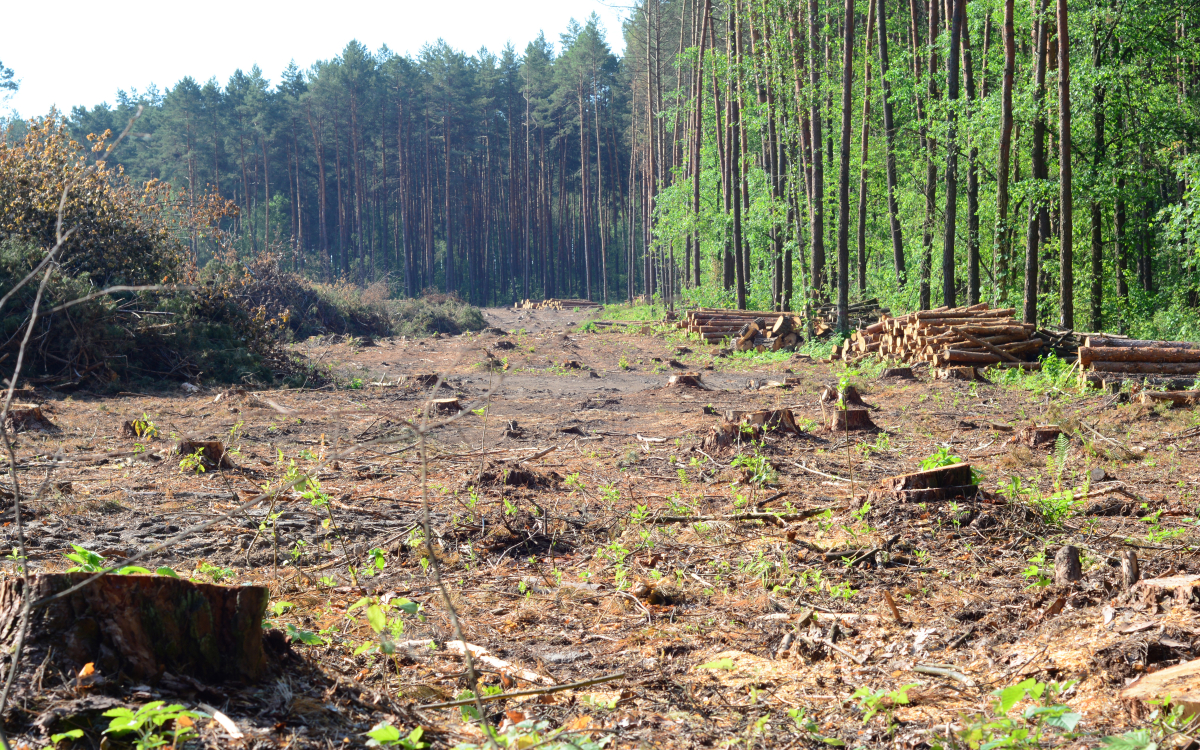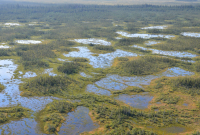Support strong Canadian climate journalism for 2025
This story was originally published by The Guardian and appears here as part of the Climate Desk collaboration.
The Canadian government has been accused of putting its domestic timber industry ahead of the global environment, following a leaked attempt to water down the world’s most ambitious regulations on deforestation-free trade.
Weeks before the United Nations biodiversity conference, COP15 in Montreal, the host nation sent a letter to the European Commission asking for a reconsideration of “burdensome traceability requirements” within a proposed EU scheme that aims to eradicate unsustainably sourced wood products from the world’s biggest market.
The letter from the Canadian ambassador to the EU, Ailish Campbell, also called for a “phased” approach that would slow down implementation, and a review of plans to include “degraded” forests among the areas considered at risk.
Green MPs and conservation groups said the lobbying effort showed the government of Justin Trudeau placed more of a priority on its paper, timber and wood products industry than the international commitment it made at last year’s Glasgow climate conference to “halt and reverse” forest loss and land degradation by 2030.
“In this letter, you can perfectly see Canada wanted to protect its economic interests rather than the forest,” said the French MEP Marie Toussaint, one of the initiators of the new regulations. “For a country that is supposed to be in favour of conserving natural resources to say ‘don’t go so fast’ is surprising, especially when they will be at the forefront of the biodiversity issue in Montreal in a couple of weeks.”
Toussaint, who is a deputy leader of the Green group in parliament, said the proposed new regulations, which are in the last stage of negotiation this week between the European Commission, council and parliament, are designed to tighten controls and checks on forest products coming into the EU. This would include geolocation requirements so that buyers can know the exact origin of wood for decking, furniture or paper. Unlike previous measures the draft does not focus solely on illegal deforestation but also legal, unsustainable practices.
It is an important step that shows the EU is serious about the 2030 target, Toussaint said. “The EU can be proud. We are doing it in an ambitious way,” she said. “This is long overdue. For decades, we’ve tried to rely on voluntary reporting and commitments, but we can see this hasn’t been working.”
The U.S.-based environmental advocacy group Mighty Earth said the proposed regulation was a potential turning point for protecting forests because it would set a new global standard. “This legislation could be a game-changer. It’s too bad that Canada is working to gut the single most important piece of forest legislation that we have seen in the past decade,” said the group’s founder and chief executive, Glenn Hurowitz.
Negotiations are at a critical stage. After this week’s talks, a deal should be hammered out by the end of the year, but the level of ambition is under dispute. Sweden, another supposedly green nation with a large logging industry, is said to have raised concerns about some human rights clauses. Poland and Italy are reportedly reluctant to include rubber among the products covered. Others, such as Germany, Belgium and Slovenia, are strong supporters of tough regulations.
Canada’s lobbying efforts are under particular scrutiny before the Montreal conference, which will put a spotlight on the country’s green reputation as well as a darker environmental side. Canada is a base for some of the world’s biggest mining firms, including Belo Sun, which aims to open a huge gold pit in the Amazon rainforest. Canada’s exploitation of tarsands in Alberta has also been widely criticized as out-of-step with efforts to keep global warming to between 1.5 C and 2 C above pre-industrial levels. The sustainability of the country’s forest-products firms, such as Paper Excellence and Resolute, has also been questioned.
The letter from Campbell notes that the country’s annual deforestation rate is less than 0.2 per cent, so Canada should be given special consideration as a “low-risk” nation.
But reports indicate that some of the nation’s exports come from old-growth forests, which are far more important than secondary woodland for biodiversity protection and carbon sequestration.
Environmental groups say the timber industry often cuts under the canopy, which is categorized as “degradation” rather than “deforestation”. It has identified fragmentation of the remaining natural forests as a major threat to biodiversity, including the nutritional intake of caribou, which now have to be given supplementary feeding from humans in one area because the lichen they usually rely on is scarcer, partly as a result of industrial logging. The situation is worst in British Columbia, where the population of caribou has declined from about 40,000 to 17,000 in the past century, with the steepest fall in the past few decades.
In the letter, Campbell insists there is no agreed definition of degradation, so it should not be included in the EU’s new regulations. But scientists insist that degraded land must be included and industrial logging of old-growth forests must be halted to align with a climate-safe world.
Campbell, who has more of an industry than environmental background, put the priority on trade in her letter. “We are greatly concerned that some elements of the EU’s draft regulation on deforestation-free products will lead to significant trade barriers for Canadian exporters to the EU. In particular, the requirements in the Regulation will result in increased costs, add burdensome traceability requirements (e.g., geolocation requirements) and risks negatively affecting trade, including well over C$1 billion in forest and agricultural products exported from Canada to the EU,” she wrote.
Hurowitz said Canada should accept tighter controls and higher standards if it wants to live up to its green reputation, otherwise its appeal for special “low-risk” treatment will smack of double standards for rich northern nations compared with poorer tropical ones.
“Developed countries know how to speak the language of sustainability. Even when they are bulldozing old-growth forests, they’re good at slapping a green veneer on it,” he said. “Trudeau presents himself as green but in lobbying to weaken the EU’s forest protection rules, he is aligning himself with the likes of [former president] Jair Bolsonaro in Brazil. Canada needs to decide which side it is on.”
More trade-focused MEPs involved in the negotiations expressed hope that Canada would live up to its green reputation. Christophe Hansen, secretary general of Luxembourg’s Christian Social People’s party, said the letter should not detract from the Montreal COP. “Canada being a host of the UN biodiversity conference does not prevent it from having its own preoccupations, but I am confident they will carry out their role as an honest broker and neutral host as they have done many times before.”
The Canadian foreign ministry and embassy to the EU have been approached for comment.






Comments
When it comes to forestry, Canada does not deserve a "green reputation".
When it comes to forestry, Canada does not deserve a "green reputation".
Another good example of the power of lobbyists and Big Business! Do we even stand a chance as citizens
Another good example of the power of lobbyists and Big Business! Do we even stand a chance as citizens
The point about caribou and lichen is that those lichens they feed on take many decades (and generations of caribou) to re-establish. There was a great YouTube video about the situation in Scandinavia, a few years back, and the struggle of the Sami people and survival of reindeer.
The thing is, you cannot cut down a forest, and then plant it back and restore the ecosystem. It doesn't work that way.
And "cutting under the canopy *used* to happen, 3/4 of a decade ago. But it's been all clear-cut, burn, and "replant" (but with single species) for a long time now.
It's as silly to expect truth from the forestry industry as it is from the petro-profits industries, or, for that matter, mining, big Ag, etc. etc. etc.
They are all now owned and run by multinational mega-corps.
A government with guts (aka cojones) would required that all corporations that touch natural resources or necessities of living be broken down into smaller units, with no central controlling power ... and then to regulate and inspect the lot of them.